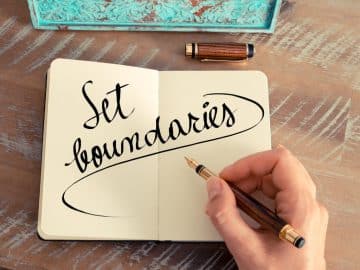Do You Want Your Relationships To Change For The Better?
Boundaries will help you get there! Seriously, adding healthy boundaries to your relationships will make your life so much better and calmer. You see, sometimes we get into unhealthy patterns with the people in our family, friends, or even coworkers. Often what starts as good intentions turns into something that ultimately isn’t serving anyone. When that happens, it’s helpful to look at the problems and consider if healthy boundaries are needed.
We read so much about boundaries and how important they are, but what exactly are healthy boundaries? A boundary is a setting that you place on yourself and others to keep you safe and healthy. Boundaries exist in all relationships including personal boundaries regarding what you see as right and wrong, boundaries with others including family and friends, and boundaries at work.
What Are Healthy Boundaries?
With healthy boundaries, we know where we begin and end and where another person begins and ends. With our boundaries, yes means yes and no means no. If we violate our boundaries, we feel it in a negative sense, such as being overwhelmed, angry, resentful, and distraught. When we set healthy boundaries we also feel it but in a positive way such as feeling strong, competent, and perhaps even pleased and happy.
I Am Allowed To:
- Feel what I feel. Feelings aren’t right or wrong, they just ‘are.’
- Think what I think
- Make mistakes
- Change my mind
- Let go of others’ expectations of me
- Feel happiness and joy as well as sadness and hurt
- Say ‘no’ and stick with this boundary
- Set boundaries with others. They might not like these boundaries, but they’re my right to set.
I Have The Right To:
- Set boundaries for myself regarding my own values, morals, ethics, and beliefs
- Set age appropriate boundaries with my children
- Not feel guilt or shame for setting healthy boundaries
- Be free of physical, emotional, sexual, and spiritual neglect or abuse
- Use legal actions if abuse has occurred
I Can:
- Choose how to respond to others’ – with anger or acceptance, hurt or healing.
- Decide what to accept with others and what not to accept.
- Celebrate for living a healthy life.
- Only ‘fix’ myself, not others, nor am I responsible for ‘fixing’ them.
- Choose how to live my life. Even if others’ think I’m living it poorly, it is still my choice to make both good and bad decisions.
- Say ‘yes’ when I am ready
- Trust my judgement
I Am Responsible For:
- My feelings, but not the feelings of others. Setting boundaries may hurt someone, but it is their choice in how to respond to my boundaries.
- My own happiness. It is not someone else’s responsibility to make me happy.
- Setting boundaries in a compassionate, respectful manner
- Being respectful to others when I say ‘no’
I Am Not Responsible For:
- Anticipating others’ needs; they are responsible in telling me about this.
- Everyone that surrounds me (children being the exception). But even with children, I choose my responsibilities and explore their responsibilities.
Setting Boundaries Is Only The First Step
If someone violates my boundaries, I have the right to confront them, reset the boundaries, and possibly, end the relationship if my boundaries are consistently violated.
Boundaries can be rigid, flexible, or too loose. By examining the above list, we can all see how to utilize flexible boundaries and to decide who and what enters our lives. It is our choice and our responsibility.
More Articles To Read About Boundaries
Establishing Boundaries with Your Loved One During Addiction Treatment
Creating Boundaries Creates Peace
Baby Steps For Setting Boundaries





















